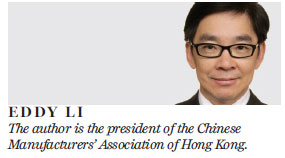Hong Kong can learn much from Macao
Updated: 2015-06-08 09:09
By Eddy Li(HK Edition)
|
|||||||||
The central government has been promoting trilateral cooperation among Guangdong province, Hong Kong and Macao. Therefore, I have been closely watching Macao, and some statistics from this SAR have astonished me. For example: In 2014, the gross domestic product (GDP) per capita in Macao was $91,376, which is higher than that in Switzerland and ranked fourth globally. Over the 15 years since its return to China in 1999, the average income has increased by 5.57 times.
As for Hong Kong, the GDP per capital was around $27,300 and $39,871 in 1997 and 2014, respectively. Economic growth over the last 17 years was only 39.5 percent. Its global ranking even dropped from 13 to 24. The pace of economic development is quite different between Hong Kong and Macao.
With a land area of only 32 square kilometers, a shortage of land is the biggest challenge facing the sustainable development of Macao. Fortunately, with help from the central government, Hengqin, with an area of 106 sq km, has helped solve this problem. Some land in Hengqin has been appropriated to the University of Macau. Some other areas are used for a Traditional Chinese Medicine Science and Technology Industrial Park of Cooperation between Guangdong and Macao (GMTCM Park).
Some people have suggested developing a Traditional Chinese Medicine (TCM) port project in Hong Kong. But for the last 17 years, nothing has come of these proposals. TCM is a promising idea - particularly in light of the growing aging population. The GMTCM Park, taking up 500,000 sq m, is dedicated to TCM healthcare and research and development. Construction work already started a couple of years ago, with Macao contributing capital and Zhuhai providing land.
However, the future development of Macao envisages far more than this. In order to reform its economic base, particularly its over reliance on the gaming industry, the Macao SAR Government is making every effort to diversify its economy and expand its economic "territory" beyond Macao - even beyond Hengqin.
"Build another Macao outside Macao" - this is a new idea which has been frequently heard in recent years. The idea was inspired by the "China-Singapore Suzhou industrial Park" - which could be copied by Macao and another mainland city.
I have learned that Macao has signed an agreement with Zhongshan last year, to transform the Cuiheng - the hometown for Sun Yat-sen - into a "little Macao". The two cities will cooperate in many areas including education, tourism, culture and commercial trading.
Another "little Macao" is likely to appear in the Nansha district in Guangzhou. Nansha has an area of 803 sq km, almost eight times as large as Hengqin, and is the largest one of the free trade zones in Guangdong. Macao's Chief Executive Fernando Chui has visited Nansha and signed multiple cooperation agreements with Guangzhou's mayor. This provides some insight into the future direction of these two places.
The gaming industry has obviously contributed much to the rapid growth of Macao's economic development. The Macao SAR Government has spared no effort to take advantage of "One Country, Two Systems" policy in developing its economy through cooperation with mainland cities. Viewing these developments in Macao, I'm very concerned about Hong Kong's future because our city is plagued by constant political bickering. Some demagogic politicians in this city have been advocating nativism, with the aim of separating Hong Kong from the mainland. They want to build a wall between Hong Kong from the mainland. Everyone has to be vigilant to these threats - especially when our competitors are catching up with us.

(HK Edition?06/08/2015 page10)